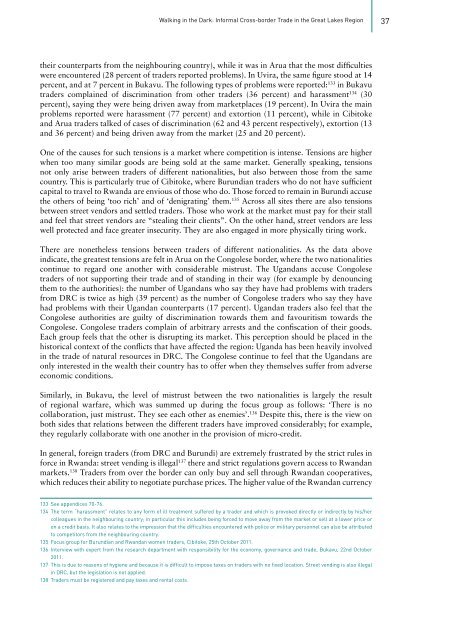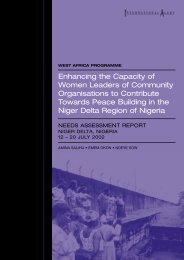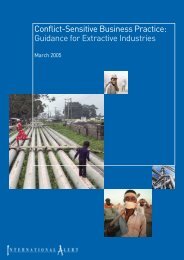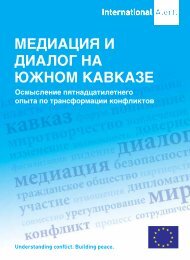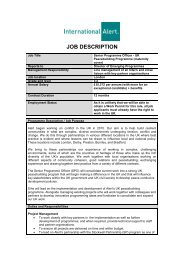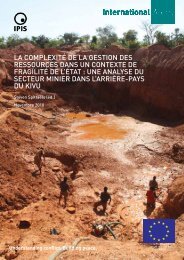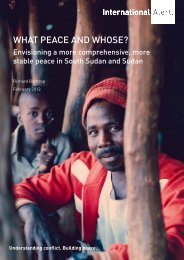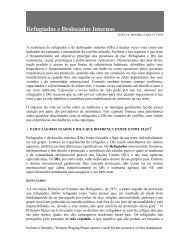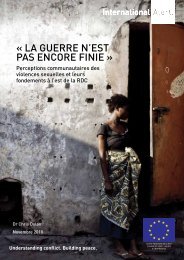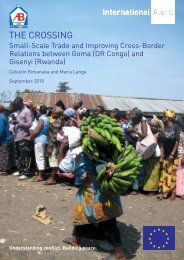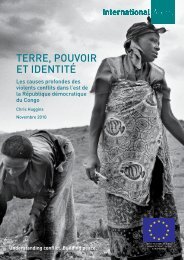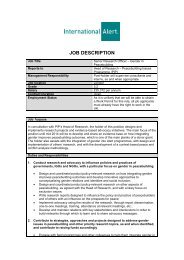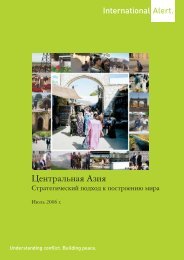Walking in the Dark: informal Cross-border trade ... - International Alert
Walking in the Dark: informal Cross-border trade ... - International Alert
Walking in the Dark: informal Cross-border trade ... - International Alert
Create successful ePaper yourself
Turn your PDF publications into a flip-book with our unique Google optimized e-Paper software.
<strong>Walk<strong>in</strong>g</strong> <strong>in</strong> <strong>the</strong> <strong>Dark</strong>: Informal <strong>Cross</strong>-<strong>border</strong> Trade <strong>in</strong> <strong>the</strong> Great Lakes Region<br />
37<br />
<strong>the</strong>ir counterparts from <strong>the</strong> neighbour<strong>in</strong>g country), while it was <strong>in</strong> Arua that <strong>the</strong> most difficulties<br />
were encountered (28 percent of <strong>trade</strong>rs reported problems). In Uvira, <strong>the</strong> same figure stood at 14<br />
percent, and at 7 percent <strong>in</strong> Bukavu. The follow<strong>in</strong>g types of problems were reported: 133 <strong>in</strong> Bukavu<br />
<strong>trade</strong>rs compla<strong>in</strong>ed of discrim<strong>in</strong>ation from o<strong>the</strong>r <strong>trade</strong>rs (36 percent) and harassment 134 (30<br />
percent), say<strong>in</strong>g <strong>the</strong>y were be<strong>in</strong>g driven away from marketplaces (19 percent). In Uvira <strong>the</strong> ma<strong>in</strong><br />
problems reported were harassment (77 percent) and extortion (11 percent), while <strong>in</strong> Cibitoke<br />
and Arua <strong>trade</strong>rs talked of cases of discrim<strong>in</strong>ation (62 and 43 percent respectively), extortion (13<br />
and 36 percent) and be<strong>in</strong>g driven away from <strong>the</strong> market (25 and 20 percent).<br />
One of <strong>the</strong> causes for such tensions is a market where competition is <strong>in</strong>tense. Tensions are higher<br />
when too many similar goods are be<strong>in</strong>g sold at <strong>the</strong> same market. Generally speak<strong>in</strong>g, tensions<br />
not only arise between <strong>trade</strong>rs of different nationalities, but also between those from <strong>the</strong> same<br />
country. This is particularly true of Cibitoke, where Burundian <strong>trade</strong>rs who do not have sufficient<br />
capital to travel to Rwanda are envious of those who do. Those forced to rema<strong>in</strong> <strong>in</strong> Burundi accuse<br />
<strong>the</strong> o<strong>the</strong>rs of be<strong>in</strong>g ‘too rich’ and of ‘denigrat<strong>in</strong>g’ <strong>the</strong>m. 135 Across all sites <strong>the</strong>re are also tensions<br />
between street vendors and settled <strong>trade</strong>rs. Those who work at <strong>the</strong> market must pay for <strong>the</strong>ir stall<br />
and feel that street vendors are “steal<strong>in</strong>g <strong>the</strong>ir clients”. On <strong>the</strong> o<strong>the</strong>r hand, street vendors are less<br />
well protected and face greater <strong>in</strong>security. They are also engaged <strong>in</strong> more physically tir<strong>in</strong>g work.<br />
There are none<strong>the</strong>less tensions between <strong>trade</strong>rs of different nationalities. As <strong>the</strong> data above<br />
<strong>in</strong>dicate, <strong>the</strong> greatest tensions are felt <strong>in</strong> Arua on <strong>the</strong> Congolese <strong>border</strong>, where <strong>the</strong> two nationalities<br />
cont<strong>in</strong>ue to regard one ano<strong>the</strong>r with considerable mistrust. The Ugandans accuse Congolese<br />
<strong>trade</strong>rs of not support<strong>in</strong>g <strong>the</strong>ir <strong>trade</strong> and of stand<strong>in</strong>g <strong>in</strong> <strong>the</strong>ir way (for example by denounc<strong>in</strong>g<br />
<strong>the</strong>m to <strong>the</strong> authorities): <strong>the</strong> number of Ugandans who say <strong>the</strong>y have had problems with <strong>trade</strong>rs<br />
from DRC is twice as high (39 percent) as <strong>the</strong> number of Congolese <strong>trade</strong>rs who say <strong>the</strong>y have<br />
had problems with <strong>the</strong>ir Ugandan counterparts (17 percent). Ugandan <strong>trade</strong>rs also feel that <strong>the</strong><br />
Congolese authorities are guilty of discrim<strong>in</strong>ation towards <strong>the</strong>m and favouritism towards <strong>the</strong><br />
Congolese. Congolese <strong>trade</strong>rs compla<strong>in</strong> of arbitrary arrests and <strong>the</strong> confiscation of <strong>the</strong>ir goods.<br />
Each group feels that <strong>the</strong> o<strong>the</strong>r is disrupt<strong>in</strong>g its market. This perception should be placed <strong>in</strong> <strong>the</strong><br />
historical context of <strong>the</strong> conflicts that have affected <strong>the</strong> region: Uganda has been heavily <strong>in</strong>volved<br />
<strong>in</strong> <strong>the</strong> <strong>trade</strong> of natural resources <strong>in</strong> DRC. The Congolese cont<strong>in</strong>ue to feel that <strong>the</strong> Ugandans are<br />
only <strong>in</strong>terested <strong>in</strong> <strong>the</strong> wealth <strong>the</strong>ir country has to offer when <strong>the</strong>y <strong>the</strong>mselves suffer from adverse<br />
economic conditions.<br />
Similarly, <strong>in</strong> Bukavu, <strong>the</strong> level of mistrust between <strong>the</strong> two nationalities is largely <strong>the</strong> result<br />
of regional warfare, which was summed up dur<strong>in</strong>g <strong>the</strong> focus group as follows: ‘There is no<br />
collaboration, just mistrust. They see each o<strong>the</strong>r as enemies’. 136 Despite this, <strong>the</strong>re is <strong>the</strong> view on<br />
both sides that relations between <strong>the</strong> different <strong>trade</strong>rs have improved considerably; for example,<br />
<strong>the</strong>y regularly collaborate with one ano<strong>the</strong>r <strong>in</strong> <strong>the</strong> provision of micro-credit.<br />
In general, foreign <strong>trade</strong>rs (from DRC and Burundi) are extremely frustrated by <strong>the</strong> strict rules <strong>in</strong><br />
force <strong>in</strong> Rwanda: street vend<strong>in</strong>g is illegal 137 <strong>the</strong>re and strict regulations govern access to Rwandan<br />
markets. 138 Traders from over <strong>the</strong> <strong>border</strong> can only buy and sell through Rwandan cooperatives,<br />
which reduces <strong>the</strong>ir ability to negotiate purchase prices. The higher value of <strong>the</strong> Rwandan currency<br />
133 See appendices 70-76.<br />
134 The term “harassment” relates to any form of ill treatment suffered by a <strong>trade</strong>r and which is provoked directly or <strong>in</strong>directly by his/her<br />
colleagues <strong>in</strong> <strong>the</strong> neighbour<strong>in</strong>g country; <strong>in</strong> particular this <strong>in</strong>cludes be<strong>in</strong>g forced to move away from <strong>the</strong> market or sell at a lower price or<br />
on a credit basis. It also relates to <strong>the</strong> impression that <strong>the</strong> difficulties encountered with police or military personnel can also be attributed<br />
to competitors from <strong>the</strong> neighbour<strong>in</strong>g country.<br />
135 Focus group for Burundian and Rwandan women <strong>trade</strong>rs, Cibitoke, 25th October 2011.<br />
136 Interview with expert from <strong>the</strong> research department with responsibility for <strong>the</strong> economy, governance and <strong>trade</strong>, Bukavu, 22nd October<br />
2011.<br />
137 This is due to reasons of hygiene and because it is difficult to impose taxes on <strong>trade</strong>rs with no fixed location. Street vend<strong>in</strong>g is also illegal<br />
<strong>in</strong> DRC, but <strong>the</strong> legislation is not applied.<br />
138 Traders must be registered and pay taxes and rental costs.


